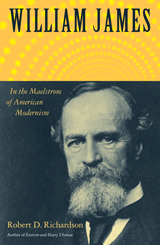This first installment happens to have debuted in ‘09 on a solemn anniversary. Solemnity however, though he had his moments of duress and misdirection, is not generally a word or condition I’d associate with William James... nor with this sparkling biography.
—jpo, 6.23.20

(9/11… will this infamous date ever again arrive without a shudder?)
Today commences our new regular Friday feature in Intro to Philosophy, a discussion of Robert Richardson’s William James: In the Maelstrom of American Modernism.
Richardson’s previous bios of Emerson and Thoreau were excellent. His turn to James should help firm up a wider scholarly recognition of a lineage that some philosophers, at least, have been reluctant to claim. But not me. Just read James’s Emerson appreciation on the occasion of RWE’s 1903 centenary, if you doubt the connection. James was more thoroughly simpatico than anyone with the characteristic Emersonian hunger for experience, as expressed in lines like: “The day is good in which we have the most perceptions.” (And btw: family legend has it that Emerson, a friend of James’s eccentric Swedenborgian father, actually “blessed” the infant William.)
Richardson (whose wife, by the way, is the wonderful nature poet/essayist/novelist Annie Dillard) begins his story by placing us with James in his bedroom in Palo Alto, California, in the pre-dawn of April 18, 1906, as the Great Earthquake began to “waggle” his room “like a terrier shaking a rat.” James met nature’s fury with “glee, admiration, delight,” but not fear. He, like Thoreau and Emerson before him, loved the “moment of contact with elemental reality” and was always on the prowl for such instances of primal immediacy and intensity. He was very good with words, but still better with experiences. He was “astonishingly, even alarmingly open to new experiences.” Not a bad thing for a Radical Empiricist to be.
James was also wide open to mysteries unseen, an attender of seances and investigator of psychic phenomena. He believed, or hoped, that “we stand in much the same relation to the universe as our canine and feline pets do to the whole of human life.” There’s much more going on, that is, than we can comprehend. Yet it goes on all around us, under our cold noses. So: we must learn to pay close and careful attention (as noted by Winifred Gallagher’s new book Rapt: Attention and the Focused Life).
Richardson notes James’s wonderful advice to teachers: “make freemen of your pupils by habituating them to act, whenever possible, under the notion of a good.” Anything you avoid on the presumption of its badness can also propel you towards something else that is good. Therein lies the path to our positive happiness.
James thought we were all afflicted with “a certain blindness” when it comes to admitting that others don’t all see the world as we do. And he sided with Robert Louis Stevenson’s great insight that personal joy wells up for each of us from the inside, subjectively. Since we can’t literally see the springs of others’ inner joy we must train ourselves to reach out to them with our own inner sympathy. Remoteness from plain sight is no excuse. He doesn’t buy the view expressed in an old Dilbert cartoon: “what’s inside a person doesn’t count because no one can see it.” It does count, more than anything. “To miss the joy is to miss all.”
And he placed another humane presumption on our side: in “The Moral Philosopher and the Moral Life” James wrote: “the best simply imaginary world would be one in which every demand was gratified as soon as made.” He knows that such a “wishing cap” world is not a practical possibility. We can’t all possess every last object of our perpetually roiling desires. He knows we must all make concessions to scarcity and the demands of peaceful coexistence. But to his credit, he wants our desires to be met. That is the the simple generosity of spirit in terms in which he understands happiness: the satisfaction of desires as they arise is a prima facie good. Failing that, we must still aim to meet as many desires as logically and practically “com-possible.”
Sacred matter. “Death moved him, most often, not to speculate on the hereafter but to redouble his energies and mass his attentions on the here and now. He remarked in Pragmatism that ‘to anyone who has ever looked on the face of a dead child or parent ‘–and he had done both– ‘the mere fact that matter could have taken for a time that precious form, ought to make matter sacred ever after’…” (7)
Delightful pessimism. “William [brought] home a volume of Schopenhauer and [read] ‘amusing specimens of his delightful pessimism’… he later came to loathe Schopenhauer’s pessimism, which he took as equivalent to determinism… Schopenhauer’s pessimism, James wrote twenty-five years later, is ‘that of a dog who would rather see the world ten times worse that it is, than lose his chance of barking at it.'” (14)
Biographically speaking: by the end of this week’s reading, on the eve of full Civil War hostilities in 1861, the 19-year old William has toyed with but rejected an artistic career. He is one step closer to the existential crisis, coming in just a few short years, that would either break or make the budding philosophical career of William James…
(And speaking of existential crises: the death of Socrates is also on today’s class agenda.)
No comments:
Post a Comment